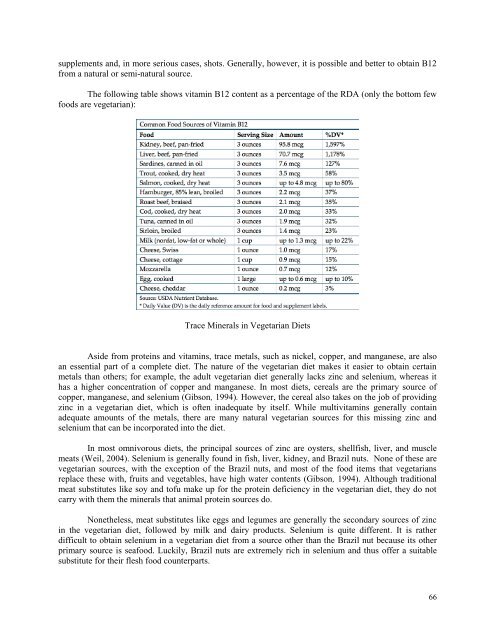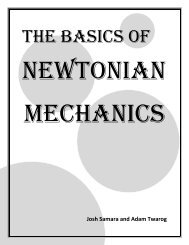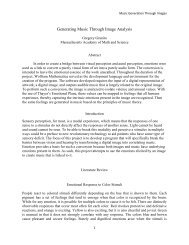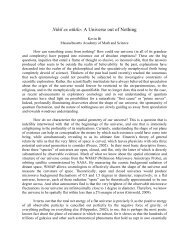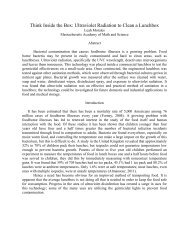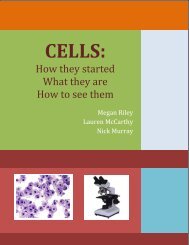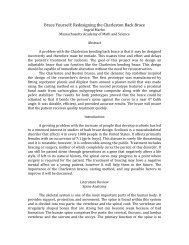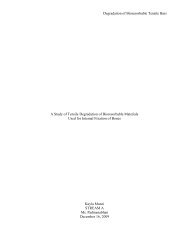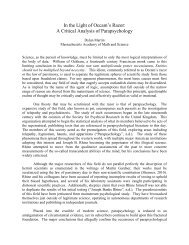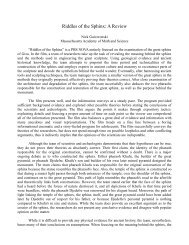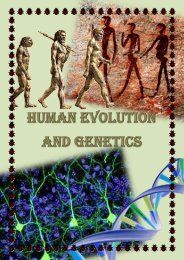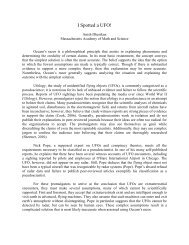Got Food? - the Scientia Review
Got Food? - the Scientia Review
Got Food? - the Scientia Review
You also want an ePaper? Increase the reach of your titles
YUMPU automatically turns print PDFs into web optimized ePapers that Google loves.
supplements and, in more serious cases, shots. Generally, however, it is possible and better to obtain B12<br />
from a natural or semi-natural source.<br />
The following table shows vitamin B12 content as a percentage of <strong>the</strong> RDA (only <strong>the</strong> bottom few<br />
foods are vegetarian):<br />
Trace Minerals in Vegetarian Diets<br />
Aside from proteins and vitamins, trace metals, such as nickel, copper, and manganese, are also<br />
an essential part of a complete diet. The nature of <strong>the</strong> vegetarian diet makes it easier to obtain certain<br />
metals than o<strong>the</strong>rs; for example, <strong>the</strong> adult vegetarian diet generally lacks zinc and selenium, whereas it<br />
has a higher concentration of copper and manganese. In most diets, cereals are <strong>the</strong> primary source of<br />
copper, manganese, and selenium (Gibson, 1994). However, <strong>the</strong> cereal also takes on <strong>the</strong> job of providing<br />
zinc in a vegetarian diet, which is often inadequate by itself. While multivitamins generally contain<br />
adequate amounts of <strong>the</strong> metals, <strong>the</strong>re are many natural vegetarian sources for this missing zinc and<br />
selenium that can be incorporated into <strong>the</strong> diet.<br />
In most omnivorous diets, <strong>the</strong> principal sources of zinc are oysters, shellfish, liver, and muscle<br />
meats (Weil, 2004). Selenium is generally found in fish, liver, kidney, and Brazil nuts. None of <strong>the</strong>se are<br />
vegetarian sources, with <strong>the</strong> exception of <strong>the</strong> Brazil nuts, and most of <strong>the</strong> food items that vegetarians<br />
replace <strong>the</strong>se with, fruits and vegetables, have high water contents (Gibson, 1994). Although traditional<br />
meat substitutes like soy and tofu make up for <strong>the</strong> protein deficiency in <strong>the</strong> vegetarian diet, <strong>the</strong>y do not<br />
carry with <strong>the</strong>m <strong>the</strong> minerals that animal protein sources do.<br />
None<strong>the</strong>less, meat substitutes like eggs and legumes are generally <strong>the</strong> secondary sources of zinc<br />
in <strong>the</strong> vegetarian diet, followed by milk and dairy products. Selenium is quite different. It is ra<strong>the</strong>r<br />
difficult to obtain selenium in a vegetarian diet from a source o<strong>the</strong>r than <strong>the</strong> Brazil nut because its o<strong>the</strong>r<br />
primary source is seafood. Luckily, Brazil nuts are extremely rich in selenium and thus offer a suitable<br />
substitute for <strong>the</strong>ir flesh food counterparts.<br />
66


